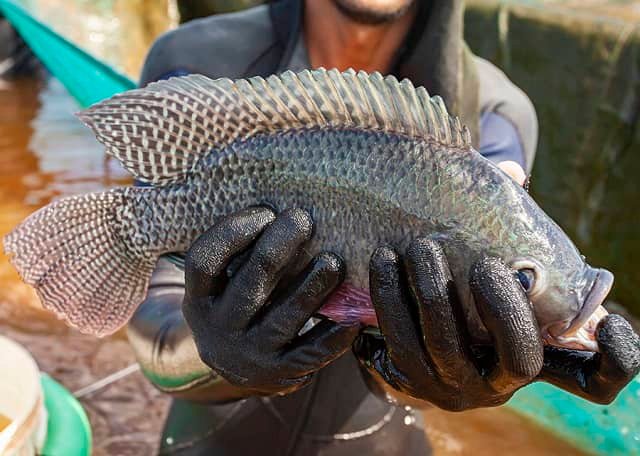
Incorporating propolis into the diet of tilapia improves their performance, particularly when the fish are stressed due to low-temperature conditions.
Nile tilapia (Oreochromis niloticus) is a popular and economically important species in aquaculture, valued for its rapid growth and versatility. However, these fish can face various challenges, one of which is the detrimental effect of cold stress (CS).
To mitigate this problem and improve the growth, redox status, and immune response of Nile tilapia, a team of scientists from King Faisal University and Cairo University explored the potential of propolis (PR) as a dietary supplement. The results are not only promising but also have significant implications for the aquaculture industry as a whole.
The Role of Propolis
Significant advancements have been made in fish nutrition in recent decades, resulting in commercial diets that promote optimal growth.
The use of medicinal and aromatic plants in fish nutrition has been considered one of the innovative strategies to enhance fish resilience to various stressors. In this context, the inclusion of bee hive products in fish diets has garnered the attention of researchers.
Propolis, a resinous substance collected by bees from plant sources, has long been known for its beneficial health properties. Rich in bioactive compounds, it has gained recognition for its antioxidant, immunostimulant, anti-inflammatory, and antimicrobial capabilities.
Previous research has demonstrated that supplementation with propolis in fish diets can moderate growth performance and the immune response of different fish species.
In this regard, the published research aimed to harness the benefits of propolis to enhance Nile tilapia’s resistance to cold stress.
Exploring Propolis Supplementation
The study was conducted in two parts. In the preliminary trial, 210 Nile tilapia fingerlings were assigned to different treatment groups. These groups received different levels of PR supplements in their diets for six consecutive weeks. The results indicated that supplementing fish diets with 10 g/kg of PR for four weeks was the ideal point, resulting in significant improvements in Nile tilapia growth.
Stay Always Informed
Join our communities to instantly receive the most important news, reports, and analysis from the aquaculture industry.
The main trial involved 480 Nile tilapia fingerlings distributed among different treatment groups. Some fish received a basal diet with a 10 g/kg PR supplement, while others did not. In addition, some fish were subjected to cold stress at 18°C, while others were maintained at a comfortable temperature of 26°C. This setup allowed for a comprehensive examination of the effects of PR and CS on the fish.
Notable Findings
The study’s results revealed some notable findings. Nile tilapia exposed to cold stress exhibited deficiencies in growth indices, redox status, and immune response compared to non-exposed fish. Conversely, those that received PR in their diets showed improvements in several key parameters. These improvements included enhanced food intake, growth indices, antioxidant enzyme activity, and immunological parameters.
Most significantly, the inclusion of propolis effectively mitigated the negative impacts of cold stress. It helped maintain fish weight, specific growth rates, feed efficiency, antioxidant enzyme activity, lymphocyte proliferation, and phagocytosis activity. It also reduced high mortality rates, the heterophil/lymphocyte (H/L) ratio, and malondialdehyde levels caused by cold stress.
Conclusion
In conclusion, the study demonstrates the potential of using propolis as a dietary supplement to improve the performance and resilience of Nile tilapia, particularly in the face of cold stress.
“Dietary supplementation with propolis at a level of 10 g/kg improved the growth performance, redox status, and immune response of Nile tilapia reared at 26°C,” the researchers conclude.
They also emphasize that propolis supplementation for fish exposed to cold stress can alleviate the negative effects of cold stress on fish weight, specific growth rates, feed efficiency, antioxidant enzyme activity, lymphocyte proliferation, and phagocytosis activity.
The findings open interesting possibilities for aquaculture practices, where environmental stressors are common. By harnessing the natural properties of propolis, the aquaculture industry can explore new ways to optimize fish growth and health while reducing the negative impacts of stressors such as low temperatures.
This research underscores the importance of innovative nutritional approaches in aquaculture and highlights the potential benefits of natural remedies for enhancing fish performance.
The study has been funded by the Deputyship for Research & Innovation of the Ministry of Education in Saudi Arabia.
Contact
Hesham A. Hassanien
Department of Animal and Fish Production, College of Agriculture and Food Sciences, King Faisal University, Hofuf, AL-HASA, Saudi Arabia, Animal Production Department, Faculty of Agriculture, Cairo University, Giza, Egypt
Email: helsanwey@kfu.edu.sa
Ahmed O. Abbas
Department of Animal and Fish Production, College of Agriculture and Food Sciences, King Faisal University, Hofuf, AL-HASA, Saudi Arabia, Animal Production Department, Faculty of Agriculture, Cairo University, Giza, Egypt
Email: aabbas@kfu.edu.sa
Reference (open access)
Alrashada YN, Hassanien HA, Abbas AO, Alkhamis SA, Alkobaby AI (2023) Dietary propolis improves the growth performance, redox status, and immune response of Nile tilapia upon a cold-stress challenge. PLoS ONE 18(11): e0293727. https://doi.org/10.1371/journal.pone.0293727
Editor at the digital magazine AquaHoy. He holds a degree in Aquaculture Biology from the National University of Santa (UNS) and a Master’s degree in Science and Innovation Management from the Polytechnic University of Valencia, with postgraduate diplomas in Business Innovation and Innovation Management. He possesses extensive experience in the aquaculture and fisheries sector, having led the Fisheries Innovation Unit of the National Program for Innovation in Fisheries and Aquaculture (PNIPA). He has served as a senior consultant in technology watch, an innovation project formulator and advisor, and a lecturer at UNS. He is a member of the Peruvian College of Biologists and was recognized by the World Aquaculture Society (WAS) in 2016 for his contribution to aquaculture.







